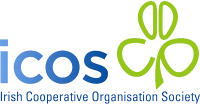
Damien O'Reilly
EU Affairs and Communication Manager, ICOS
Letter from Brussels - March 2023

The sign draping the side of one corner of the iconic Berlaymont EU Commission building here in Brussels advertises REPowerEU. It is a new plan with a double goal – to reduce the dependence on gas, oil, and coal imports from Russia, while at the same time accelerating the EU’s ambitious climate-action targets.
The clean-energy transition can only be good news for hard-pressed families struggling to pay astronomical home-heating and electricity bills. So REPowerEU and all its armoury cannot come fast enough. Back home, ICOS is one of a few organisations working closely with its member co-ops to look at renewable opportunities – specifically in relation to biomethane – to capitalise on this drive to a green transformation. According to the
Sustainable Energy Authority of Ireland (SEAI), the percentage of renewables in 2021 in Ireland was 12.5 per cent, significantly behind the EU average where the overall renewables percentage stood at 21.8 per cent, according to Eurostat.
The EU has a reduction target of 55 per cent by 2030, in the context of overall emissions, when compared to 2018. Every project has a fancy name or acronym and this one is called ‘Fit for 55’. The revised Renewable Energy Directive (RED III) targets are for 45 per cent renewable energy across the EU by 2030. In Ireland, the target for biomethane is set at 10 per cent of the country’s gas needs by 2030. “It appears that this will only be incentivised by way of a renewable heat obligation or RHO, obligating an increasing percentage of gas to come from renewable sources and letting market forces, rather than a guaranteed tariff, create a price floor for biomethane,” says bioeconomy executive with ICOS, John Brosnan.
“Biomethane has a key role to play in the decarbonising of not only our energy sector, but it can also contribute to reducing emissions in the agri-food sector and to provide additional income to farmers,” according to John. This is where it gets interesting for farmers. John is driving communication between farmers and co-ops on the potential to develop the industry in Ireland. “ICOS is supportive of the development of anaerobic digestion and production of biomethane alongside other renewable sources which we support.” But, he says this cannot come at the expense of food and feed security. “Nor can farmers and co-ops be expected to bear all of the risk in embracing renewables with high upfront capital costs.”
Back in Brussels, as RePowerEU attempts to speed up the switch to renewable energy, Irish co-ops are perfectly positioned and equipped to drive the development of biorefining. It’s a win-win for farmers as an income source while playing a key role in meeting the EU’s green targets. And hopefully it will be the beginning of the end of dependence on Russian gas and oil. Watch this space.






